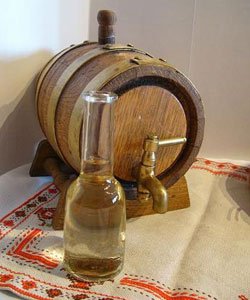

© Photo: Lyudmila Savova
In times of crisis a number of Bulgarians are concerned with prices and wonder which type of rakia is cheaper. The homemade, of course. Production of rakia at home is a part of the Bulgarian culture in a number of regions. The tradition is attractive to foreigners, too. Two years ago the retired English policeman Michael Weavers, who now lives in the Bulgarian village of General Toshevo won the local rakia competition. The locals now call him with respect Bai Michael.
It is known that monks from the monasteries near the town of Troyan in Central Bulgaria are masters of the plum rakia, which is prepared according to a recipe from the 19th century. At least 12 different types of herbs are used but special varieties include 33 herbs. In the monasteries the rakia is stored in oak casks. Before pouring the rakia into bottles, it is blessed in front of an icon of St. George.  Vassil Mandzhukov from the village of Oreshak told us more about the tradition of rakia production. “You should only drink rakia that has aged for 12 years,” he claims. “When we make rakia, we keep it in an oak cask for 6 months, before pouring into glass bottles and burying them in the ground,” he explains and adds: “Aged rakia has different qualities and that is why my father diet at 95.”
Vassil Mandzhukov from the village of Oreshak told us more about the tradition of rakia production. “You should only drink rakia that has aged for 12 years,” he claims. “When we make rakia, we keep it in an oak cask for 6 months, before pouring into glass bottles and burying them in the ground,” he explains and adds: “Aged rakia has different qualities and that is why my father diet at 95.”
English: Alexander Markov
According to a 2023 National Statistical Institute study, more than 88% percent of households in Bulgaria have access to the Internet. Most users are online every day, and more than 95% are active on social networks. The share of people who read the..
Radio Bulgaria, as a program of the BNR published in 11 languages, has an audience spread over six continents. Part of it has a special attitude towards our country and wants to learn more about its history, culture, traditions and..
The international initiative No Elevators Day will be celebrated today with a climb to the fourteenth floor of the College of Tourism in Burgas. Anyone who wants to join in can test their physical strength by participating individually or in a team..
Every child dreams of having all the time in the world in which to play and enjoy piles of sweet delights. One of the most favorite, of course, is His..
Bulgarian folk dances from the Pirin region and all folklore areas will be performed on 26 and 27 April at the White Stage Event Complex in the mountain..

+359 2 9336 661
